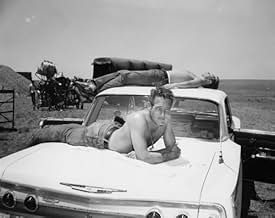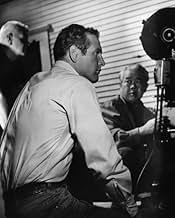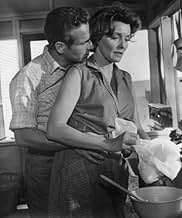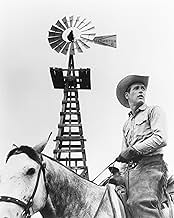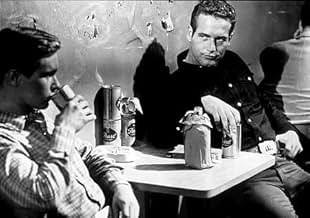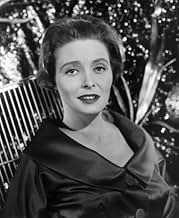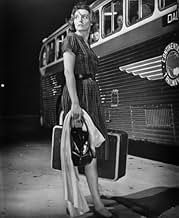हड बैनन (पॉल न्यूमैन) एक इज़्ज़तदार रैंचर का विद्रोही बेटा है जो लगातार अपने बूढे पिता से भिड़ता रहता है। पैट्रीशिया नील और मेल्विन डगलस सह कलाकार हैं, अपनी ऑस्कर पुरस्कृत भूमिकाओं में।हड बैनन (पॉल न्यूमैन) एक इज़्ज़तदार रैंचर का विद्रोही बेटा है जो लगातार अपने बूढे पिता से भिड़ता रहता है। पैट्रीशिया नील और मेल्विन डगलस सह कलाकार हैं, अपनी ऑस्कर पुरस्कृत भूमिकाओं में।हड बैनन (पॉल न्यूमैन) एक इज़्ज़तदार रैंचर का विद्रोही बेटा है जो लगातार अपने बूढे पिता से भिड़ता रहता है। पैट्रीशिया नील और मेल्विन डगलस सह कलाकार हैं, अपनी ऑस्कर पुरस्कृत भूमिकाओं में।
- निर्देशक
- लेखक
- स्टार
- 3 ऑस्कर जीते
- 17 जीत और कुल 17 नामांकन
- Lonnie Bannon
- (as Brandon de Wilde)
- Myra
- (as Sharon Hillyer)
- Proprietor Sweeping Glass
- (बिना क्रेडिट के)
फ़ीचर्ड समीक्षाएं
Melvyn Douglas is a truly under-appreciated American acting genius whose career spanned over 5 decades. His range is tremendous. This is the same honey-tongued actor who is the perfect comic foil to Garbo's Ninotchka in the '30's (In fact, he is one of her only REPEAT leading men!) And his bluster-filled performance in I Never Sang for My Father (with another modern great, Gene Hackman) is also out of this world! Other commentators have addressed Hud's multi-faceted story and the incredible B&W cinematography. All wonderful - but the next time you watch this true American classic, focus on Douglas' Oscar-winning performance. You will be amazed! (And remind yourself of some of the early roles in romantic comedies - Ninotchka, That Uncertain Feeling, This Thing Called Love or Mr. Blandings Builds His Dream House - this same actor performed so well.)
Hud lives with his elderly father Homer (a wonderfully understated performance by Melvyn Douglas) and nephew Lonnie. Their small, struggling ranch serves not only as a livelihood, but also the source of Homer's ethical values. Another main character is Alma, the attractive housekeeper and cook. For all four of them it's a hard life, but a worthwhile life, at least as Homer sees it. Hud sees it differently. But then Hud is a product of modern times, with differing values from those of Homer and his generation. When a crisis occurs that puts their ranch in jeopardy, these differing values clash, resulting in tension between Hud and his father.
Hud's ongoing rebellion, rooted in heredity and environment, takes the form of booze, brawls, women, and anger. Hud is a heel, but a sympathetic heel. We understand his frustrations. Larry McMurtry's story presents a naturalistic interpretation of human character. Hud is constrained by forces over which he has no control. For him, like for many of us, freedom of choice is mostly an illusion. The morality of absolutes, as expressed by his father, does not work in Hud's favor.
But there's a fifth character in this morality tale ... the land. The bleak, desolate plains with its buzzards, ubiquitous dust, and lonesome vistas can depress the most optimistic spirit. In this film, the monochrome canvas accentuated by James Wong Howe's use of single source lighting makes the natural environment seem appropriately oppressive. And the film's sounds amplify the gritty realism of this unforgiving land.
I have a couple of minor criticisms. The screenplay puts too much emphasis on Alma, given that she is the housekeeper. Second, there's not enough music or humor. Others will disagree, but I would have preferred a more prominent role for the mournful sounds of Hank Williams type music, a la "The Last Picture Show".
Interestingly, Hud's comment on life is the same in meaning as the words spoken years later by a real-life nihilistic antihero, who said: "No one here gets out alive". While we think we know what happened to the real-life antihero, we don't know what became of Hud. Perhaps someday someone will make a credible sequel. Then they can add more music. Imagine the mood evoked by the sight of Hud riding off into the Texas sunset, to the sounds of "Riders On The Storm".
Hud is an amoral and unemotional rancher. He, very often, comes into a conflict with his father, which has a negative impact on his young nephew. His father holds Hud responsible for the death of his other son. He tries to imbue his grandson with a sense of decency and responsibility to others. When their cattle fall ill, the conflict between father and son begins to escalate...
The Texas cow country is represented through a discord in a family. It's nothing new, but a realistic approach is enriched with dose of a sick materialism and immorality, which is probably the biggest asset of this film. This is a cold review of one human mind, which rejects any kind of traditional values. Characters is placed on the scale several times, but it is clear that there is no winner. One thing is certain, this is not a conflict between traditional and modern ways of thinking.
The scenery is a kind of combination between a poor ranch and cheap city. The atmosphere is grim and tense. Characterization is very good.
Paul Newman as Hud Bannon is a restless, arrogant and ambitious rancher. He is a man, who has fallen into a trap of modern understanding of life around him. He, at the same time, understands and despises the people around him. Mr. Newman is a charming monster in this film.
Melvyn Douglas as Homer Bannon is a traditional farmer who loves his ranch and cattle more than his own son. He is an old man who sees his own disappointment and shame in actions and behavior of his son. Mr. Douglas has offered a very touching performance.
Brandon deWilde as Lonnie Bannon is a young man who is torn with relationship between his venerable grandfather and his harsh and greedy uncle. He is naive, sensitive and, perhaps, sexually depressed. Patricia Neal as Alma Brown is a lonely housewife with a broken heart and a strong dignity. Ms. Neal has almost stole this show.
The two characters couldn't be more opposite, as one sees in their treatment of a potential run of hoof and mouth disease that could wipe out Homer's entire herd. Hud wants to ship the whole herd out and possibly infect other people's cattle - he couldn't care less. Homer won't hear of it.
If you love animals, this is a difficult film to watch, but it's worth it. Melvyn Douglas is absolutely gut-wrenching as Homer, a proud man who loves the land and his cattle and who has no use for his son, who smashed his car and killed Homer's other son. de Wilde is Hud's nephew who admires him and wants to emulate him but as time goes by, realizes that Hud is made of ice. de Wilde doesn't give an emotional performance - he's almost more of an observer. It works well here amidst the very contained Douglas and the free and easy Newman. You can see he's a good kid trying to grow up and decide what kind of man to be.
Patricia Neal is the housekeeper; she and Douglas both deservingly won Oscars. Her delivery is wry and knowing; she can't help being attracted to the virile Hud but she knows he's trouble and never gives in to her desires willingly.
As much as I love Newman and think he's one of the greatest actors ever to hit the movies, for me, Douglas' searing performance is the one that will stay with me. It's easy to see why in 1963 this was such a dramatic breakthrough for Newman, but 43 years and many roles later, we're more familiar with what he can do. We know he can play a cold bastard now. His greatest performances for me will always be those in the "The Verdict" and "The Hustler," both of which called for many more nuances of character. Hud represents '60s disillusionment - which as the decade went on was only going to get worse; this is one of the reasons it is an iconic role. For me, Newman had more surprises in store.
Brilliant performances, excellent direction, stark photography, Hud is a great American film, not easily forgotten once seen.
**** (out of 4)
One of the bleakest films ever made, HUD centers on the title character played by Paul Newman who is about as ruthless as one can be. He cares for very little in this world and everything he does love is usually something bad. His father (Melvyn Douglas) has hated him for some time now but after their cattle grows sick they begin to butt heads.
HUD certainly isn't a very cheerful film and it's one of the darkest and in reality sadness movies ever made. While it's not always easy to watch there's no denying its impact plus the fact that it contains three of the greatest performances that you're ever going to see. HUD works on many levels but it's strength is certainly the performances as well as its honest character study of someone most people will find cool but when you get pass all the smoke you see a rather ugly human being.
The screenplay itself is extremely laid back and in fact the film is pretty quiet. There's not too much screaming or long speeches but instead there's just a very realistic tone that comes across quite natural and real. I think most people will be able to look at these main four characters and either be one of them are know someone like them. There's the young cool guy who hurts everything that he comes into contact with. There's the older wise man who stands by his morals. There's a broken house maid who is probably hiding some sadness. Then there's the young nephew who looks up to Hud not knowing or understanding his type of character.
Then, there are the terrific performances, which are among the best you'll ever see. Newman never had an issue playing cool but he always made it look so easy. He brings that quality to Hud but there's also that underlying dirty and dangerous part. There's just a certainly coldness that Newman brings to the character, which we never saw from him in his other roles. Douglas rightfully won the Best Supporting Actor Oscar for his deep and very sincere performance. Neal is a great big ball of sadness and her deep eyes just say so much without her having to speak a word. Even Brandon De Wilde is very impressive in his role and especially when you consider the major talent he was acting against.
HUD also features a terrific and haunting music score and the Oscar-winning cinematography perfectly captures the dusty dirt roads. The film manages to keep getting better with time as its messages are perhaps more true today than when the film was originally released.
क्या आपको पता है
- ट्रिवियाPatricia Neal was particularly proud of one unscripted moment that made it into the film. While talking to Hud about her failed marriage, a huge horsefly flew onto the set. Just as she says she's "done with that cold-blooded bastard," she zaps the fly with a dish towel. Martin Ritt loved it and printed the take.
- गूफ़In the first scene, you can see the cameramen and tripod of the cameras in the window of the store.
- भाव
Homer Bannon: Lonnie, little by little the look of the country changes because of the men we admire. You're just going to have to make up your own mind one day about what's right and what's wrong.
- कनेक्शनFeatured in The 40th Annual Academy Awards (1968)
- साउंडट्रैकThe Great Titanic (It Was Sad When That Great Ship Went Down)
(uncredited) (ca 1915)
American folk song
Sung a cappella by Paul Newman and Brandon De Wilde
टॉप पसंद
- How long is Hud?Alexa द्वारा संचालित
विवरण
बॉक्स ऑफ़िस
- बजट
- $25,00,000(अनुमानित)
- चलने की अवधि1 घंटा 52 मिनट
- रंग
- पक्ष अनुपात
- 2.39 : 1
इस पेज में योगदान दें



